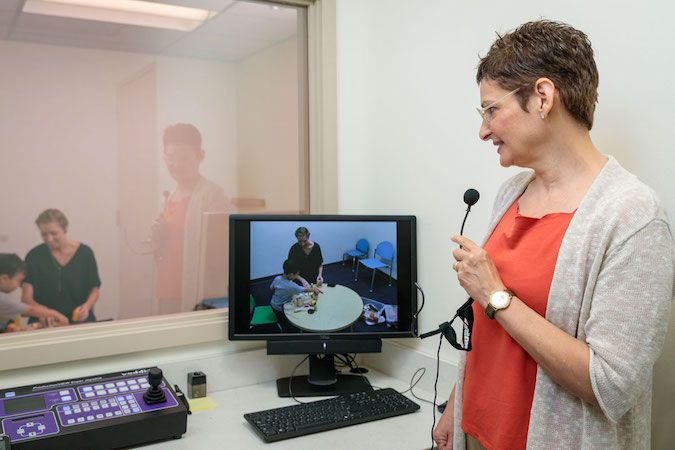Article
Interactive Therapy Reduces Childhood Depression
Author(s):
An interactive parent-child therapy appears to reduce depression in children 3-6 years old. Interestingly, the therapy also improved symptoms of clinical depression in participating parents.

Joan Luby, MD, observes a parent and child through a one-way mirror and, using a microphone and earpiece, coaches the parent on how to help keep the child's emotions under control. The intervention helps relieve symptoms of clinical depression in young children. Credit: Matt Miller
Research from Washington University School of Medicine in St. Louis indicates that children as young as 3-6 years old with depression can benefit from parent-child interactive therapy.
"The study provides very promising evidence that an early and brief psychotherapeutic intervention that focuses on the parent-child relationship and on enhancing emotion development may be a powerful and low-risk approach to the treatment of depression," said lead study author Joan Luby, MD, of Washington University School of Medicine in St. Louis. "It will be very important to determine if gains made in this early treatment are sustained over time and whether early intervention can change the course of the disorder."
In the study, researchers modified a program known as Parent-Child Interaction Therapy (PCIT) that was created in the 1970s to reduce disruptive behavior in preschoolers. The research team adapted the treatment to target young children with depression, adding an emotional development (ED) module to the series of sessions.
"We consider depression to be an impairment of the ability to experience and regulate emotions," said Luby.
The study included 229 parent-child pairs who were randomly assigned to PCIT-ED therapy or placed on a waitlist. Pairs in the treatment group went through 12 treatment session of PCIT followed by 8 sessions in the emotional development module.
One of the emotion-focused sessions involves a package in the room that the child must wait to open. The researcher observed through a one-way mirror, coaching the parent through the experience via an earpiece. The interaction is designed to enhance the child’s emotional competence and strengthen emotional self-regulation.
"This study builds on programmatic research that has identified factors associated with the development and course of depression among very young children and in turn, represent targets for intervening," said Joel Sherrill, PhD, deputy director of the NIMH Division of Services and Intervention Research. "Using a modular approach that builds upon the well-established PCIT platform may ultimately help facilitate dissemination of the ED intervention."
After the 18 weeks of treatment, children in the PCIT-ED group were more likely to no longer show signs of depression. Treated children were also more likely to have less severe depressive symptoms compared to those on the waitlist.
Interestingly, the researchers noted that parents in the treatment arm of the study also reported improvements in symptoms of clinical depression. Additionally, parents in the PCIT-ED group had lower levels of parenting stress and reported using more parenting techniques focused on emotional reflection and processing than parents on the waitlist.
"Even without targeting the parent directly, if a parent has been depressed, his or her depression improves," Luby said. "It previously had been demonstrated that if you treat a parent's depression, a child's depression improves, but this is powerful new data suggesting that the reverse also is true."
Luby noted that the treatment doesn’t require a psychiatrist and can be provided by clinicians with master’s degrees.
"This is a therapy that could be widely disseminated," Luby said. "Since it only takes 18 weeks and doesn't require a child psychologist or psychiatrist, we think it would be highly feasible to deliver in community clinics from a practical standpoint and in terms of cost."
The study, “A randomized controlled trial of parent-child psychotherapy targeting emotion development for early childhood depression,” was published in the American Journal of Psychiatry.




